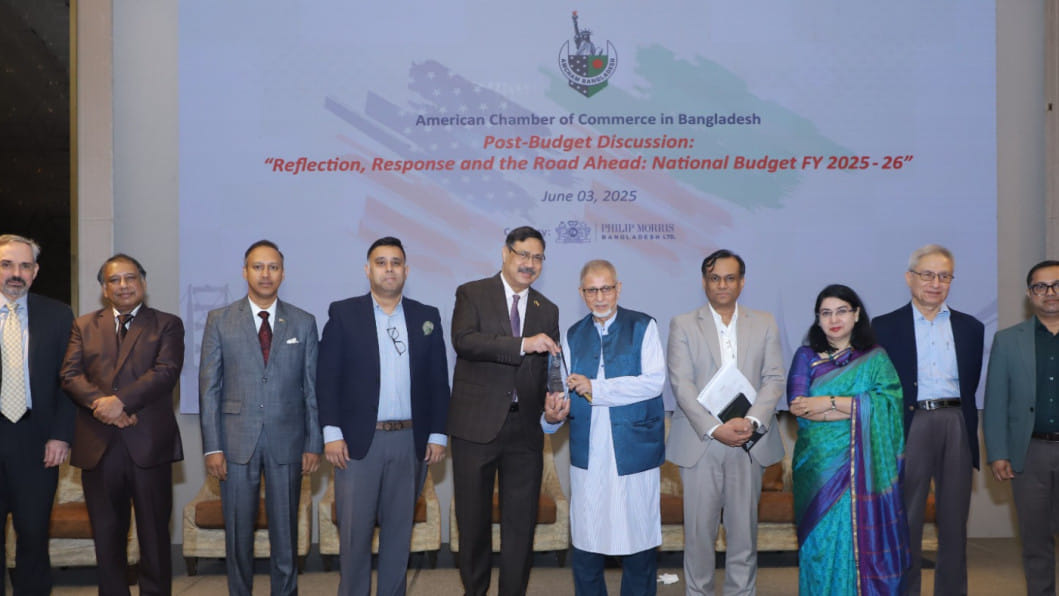Corruption pervasive across the country

Corruption remains a pervasive challenge across the country, undermining the effective implementation of the national budget, Anisuzzaman Chowdhury, special assistant to the chief adviser, said at a post-budget discussion yesterday.
"There is no place in Bangladesh where corruption has not occurred," Chowdhury said at a post-budget discussion organised by the American Chamber of Commerce in Bangladesh (AmCham) at Sheraton Dhaka in Banani.
He noted that while the proposed budget sets ambitious goals, corruption and inefficiency in public spending remain major obstacles.
"The problem is not allocation, but how the money is spent," he said.
Chowdhury highlighted the government's growing reliance on domestic borrowing, saying that borrowing itself is not harmful if used productively and transparently.
He also stressed the need for institutional reforms, better policy coordination, and stronger oversight.
"Public funds are often misused or directed to the wrong projects, undermining development efforts year after year," he warned.
M Masrur Reaz, chairman and CEO of Policy Exchange Bangladesh, termed several targets in the proposed budget as "overly ambitious," particularly the goal of raising private investment to 24.3 percent of GDP amid domestic demand shortfalls, energy constraints, and political uncertainty.
"Achieving that would require major improvements in imports, forex stability, and inflation control," he said.
He also labelled the 6.5 percent inflation target as "unrealistic."
Additionally, Reaz expressed concern over the "tax-heavy" nature of the budget, noting that it disproportionately burdens small and medium enterprises.
He criticised the rise in corporate tax for non-listed firms, urging instead to widen the gap by reducing rates for listed companies.
Most importantly, he said the budget lacks a clear reform roadmap in trade, fiscal capacity, and public service delivery — areas where real progress could begin immediately.
Fahmida Khatun, an executive director at the Centre for Policy Dialogue, said the government continues to prioritise physical infrastructure over social infrastructure, with education and health once again underfunded in the budget for FY26.
The allocation for education dropped to 1.53 percent of GDP, down from 1.67 percent last year, far below the 8th Five-Year Plan's target of 4 percent.
"Among 39 least developed countries, Bangladesh ranks third-lowest in education spending," she noted.
Health fares worse, with the allocation falling to 0.67 percent of GDP.
Khatun also highlighted poor fund utilisation and a focus on infrastructure over quality.
She warned that without skilled human resources, the country risks building infrastructure it cannot run efficiently.
Zahid Hussain, a former lead economist at the World Bank's Dhaka office, questioned the feasibility of the government's Tk 5.6 lakh crore revenue target in the proposed budget.
"The highest revenue Bangladesh has ever achieved is around Tk 4 lakh crore. A leap to 5.6 lakh crore in one year is unrealistic," he said.
He noted that while the budget includes measures to boost revenue, historical performance suggests the target is overly ambitious.
Hussain termed the foreign financing target — particularly net foreign financing — as achievable, but said it depends on improved utilisation of project credits.
On domestic financing, he said the target might be met, but its success hinges on deposit growth in the banking sector and the system's ability to mobilise funds without causing distortions.
Syed Ershad Ahmed, president of the American Chamber of Commerce in Bangladesh, acknowledged several positive steps in the proposed budget, including incentives, tax moderation, and structural reforms in the banking sector.
He also welcomed the formation of an industrial promotional body and improvements in one-stop services for investors.
However, he raised key concerns, stressing that law and order must be strengthened to support industrial growth.
Ahmed also pointed to inefficiencies in customs procedures, poor implementation of existing policies, and weak logistics infrastructure.
"Without addressing these bottlenecks, the government's initiatives will fall short of delivering meaningful industrial progress," he said.
Among others, Mirza Mohammad Moinul Sadat, first secretary of the National Board of Revenue, also delivered an address.
The event was moderated by Md Moinul Huq, Citi country officer at Citibank NA, Bangladesh.

 For all latest news, follow The Daily Star's Google News channel.
For all latest news, follow The Daily Star's Google News channel. 



Comments